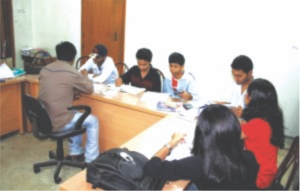| Home - Back Issues - The Team - Contact Us |
 |
| Volume 11 |Issue 21| May 25, 2012 | |
|
|
Special Feature
The Coaching Business Despite the government's intention to ban private coaching, many students, especially those who recently passed their Senior Secondary Certificate (SSC) exams, are heavily dependent on private coaching. Naimul Karim
For Muntasir Ahmed, the last ten months were the most tiring days of his life. "I had to wake up at 8 in the morning every day, to go to tuitions, followed by school and coaching classes," he exclaims. Back then his SSC exams were just months away and the increasing competition meant that he had to work twice as hard as before. "My day would end at 9 pm, following the last of my coaching classes and I had no time for anything else," says the smiling 15-year-old, who was glad to have passed, in his words, the 'first major obstacle' of life. “I had to go to coaching since most of the teachers at school didn't teach properly. The good teachers were available for only two days a week and that really didn't help much,” explains Muntasir who went on to score a high grade point average (GPA) of five. A number of students interviewed by the Star, who passed their SSC exams this year, echoed similar sentiments. “The model papers available in some of the coaching centres are really helpful. They train you, make you feel confident before an exam and eventually help you prepare well,” says Syeda Tasneem, who scored an A plus and received the golden honour roll. The statements prove that despite the government's repeated attempts to put a bar on coaching centres, students still prefer to go for private coaching. "At times the syllabuses remain incomplete and the teacher doesn't always have the time to explain each and every detail in class. In those circumstances, private coaching helps a lot," says Arafat Qazi, a student from a school in Motijheel. The latest action against coaching centres came in January this year, when Education Minister, Nurul Islam Nahid formed a four-member committee, to collect information on teachers running coaching centres. The move was in response to a High Court ruling that questioned the legality of coaching centres, last year.
Members of the Education Ministry, in a recent report, have stated that certain teachers from prominent schools and colleges in Dhaka evade their classroom duties and create situations where students are forced to take tuition beyond school hours. While the Education Minister admits to the problems regarding private coaching, he adds that it wouldn't be possible to close down the centres overnight. Manzur Jalal, father of a student studying in Mohammadpur, narrates how he was forced to enroll his daughter into a coaching centre last year, “My daughter is currently in class nine. Last year when she was about to appear in the Junior School Certificate exam, we noticed that her syllabus was incomplete. I wrote a letter to the director of the institution, complaining about the matter, but it made no difference. We had no alternative other than spending a handsome amount of money for special coaching. It's nothing but a dirty business.” Humayun Hyder, a parent of a student studying in class ten, reiterates Jalal's views, “I don't think it's worth spending a huge amount of money every month on the school fees and coaching centres for the same purpose. I don't understand why extra coaching is required when the schools pay their teachers for doing the same job.” Critcising the low pay-scales of public schools, Sara Hossain, a teacher from a prominent institution, claims that teachers lose interest in classrooms due to the low wages. “How can we expect talented and brilliant people to take up teaching as a profession if they are not provided with a proper salary? Why will they want to live an ordinary life? My friend, who is a doctor, is now the owner of a multistoried building, whereas I am still living in a rented apartment. That's because I'm a teacher,” says Hossain.
The low salary-scales have also encouraged certain teachers to take full-time jobs at various coaching centres. Twenty-eight-year-old Abdul Rahman, a Masters graduate, is one such example. “I initially joined a school. But after weighing my options, I decided to join a coaching centre. I got paid on the basis of the number of students that joined my class and that was a lot more than what any other public school would have offered to pay me,” says Rahman. One of the steps taken by the ministry, to prevent students from going to coaching, was the introduction of 'after-school' classes for weaker students, in August last year. The scheme however, didn't work out too well as the teachers were paid a very low amount for the extra classes. A report published by the Bangladesh Bureau of Statistics (BBS) in 2007 identified around 5,500 coaching centres in the country, a figure that must have increased by a huge margin in the last couple of years. It further states that more than 80 per cent of the students receive private tutoring or go to coaching centres by the time they reach class ten. The fact that society has accepted the presence of coaching centres so easily –both the teachers and the students who have adjusted themselves to the system—will make it extremely difficult for Nahid and his ministry to bring any significant change in the system. For now, it seems the education sector, which is supposed to be doing a service to society is being dominated by various profit-making ventures, the coaching centres being one of them. The ministry's drive to curb private coaching, alone, by no means, can solve the problem. Upgrading the teachers' salary structure in accordance to the current costs of living is a must, if the government seriously intends to restrict the growth of coaching centres.
|
||||||||||||
Copyright
(R) thedailystar.net 2012 |



